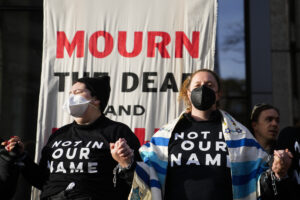What Would Orange Telecom’s Departure From Israel Really Mean for the BDS Boycott Movement?
Stephane Richard, CEO of the French telecommunications company Orange, embroiled himself in an international incident Wednesday during a visit to Cairo, when he said his company would withdraw its logo from the Israeli market “tomorrow” if he could.
Stephane Richard, the CEO of the French telecommunnications company Orange embroiled himself in an international incident on Wednesday during a visit to Cairo, when he said that his company would withdraw its logo from the Israeli market “tomorrow” if he could. The reason is that the Israeli firm Partner, to which Orange licensed its brand name, has built 100 telecommunication antennas on confiscated Palestinian land. Partner telecom has about 28% of the Israeli market. Richard did also say that he understood that the investment in the settlements was also an issue in the Arab world, into which Orange wants to expand further.
The issue is not boycotting Israel proper. Richard would have had no problem with doing business with a Tel Aviv firm that had no West Bank presence. The issue is profiting from a vast project of illegal theft of an occupied people’s property. But the controversy signals something I predicted: As mainstream Israeli companies become more and more intertwined with West Bank settler investments and partners, all Israeli businesses risk getting caught up in BDS (the campaign to boycott, sanction and divest from Israeli firms implicated in the settlements). A similar dilemma hurt the Sodastream company, which suffered economic reversals after it advertised at this year’s Superbowl, drawing attention to itself. Many American consumers were disturbed to discover that one of the company’s factories was in the West Bank (it has since been closed), and they launched a boycott campaign against it.
Since the French foreign ministry (like those of the UK, the Netherlands and other European countries) has advised the country’s corporations not to partner with Israeli firms doing business in Israeli squatter settlements on the Palestinian West Bank, critics had argued that Orange is contravening French policy.
The reason for the foreign ministry warning is that European firms making money from the illegal Israeli squatter settlements on the Palestinian West Bank could theoretically be sued in European courts under the Rome Statute and under a 2004 finding of the International Criminal Court that the squatter settlements contravene international law. Orange’s Richard is eager to avoid such a lawsuit now that Partner has dragged the company’s brand into the settlement controversy.
Richard’s comment was vehemently denounced by Israeli Prime Minister Binyamin Netanyahu.
In 1998, when Orange was owned by the Chinese corporation Hutchison, it did a deal to lend its brand to the Israeli firm “Partner,” a cell phone company. Two years later, Orange was acquired by France Telecom, which is partially government-owned. Orange doesn’t actually have any operations of its own in Israel and owns nothing there, it just allows Partner to display its brand. Presumably Israeli cell phone subscribers are more impressed by a global brand like Orange than they would be by “Support,” which actually provides their communications. A controlling interest in Partner telecom was bought by billionaire Haim Saban last December.
Richard is therefore between Scylla and Charybdis. If he broke the brand licensing agreement with Partner before it ran out, he could be sued for breach of contract. But if he continues to make money from Partner as it expands into the settlements, he could be sued in Europe for profiting from illegal squatting and expropriation. He said, according to The Guardian, “If you take those amounts on one side and on the other side the time that we spend to explain this, to try to find a solution and the consequences that we have to manage here but also in France, believe me it’s a very bad deal. . .”
In short, Richard’s comment has nothing to do with “boycotting the Israeli state,” contrary to what Netanyahu maintained. It is about the squatter settlements and their illegality. It is about profiting from an epochal crime.
I wrote last winter regarding the Sodastream controversy:
Your support matters…“The European Union has decided to use its economic clout to push back against the clear Israeli determination to annex the whole West Bank while keeping its indigenous Palestinian population stateless and without the rights of citizenship.
The European Union has insisted that Israeli institutions and companies based in the Palestinian West Bank be excluded from any Israeli participation in a program of the European Union. (The EU treats Israel like a member, offering it many perquisites, opportunities for technology interchange, and access to EU markets; Brussels is saying, however, that none of that largesse can go to Israelis in the Occupied Weat Bank.)
About a third of Israel’s trade is with Europe (the US and China are its biggest trading partners, and Turkey comes after the EU). The EU imports $300 million a year from the settlements, but is clearly moving toward cutting that trade off.
Norway’s enormous sovereign wealth investment fund has just blacklisted Israeli firms with settlement ties.
This follows on a Netherlands’ investment fund divesting from five Israeli banks that fund squatter settlements on Palestinian territory.
European governments are increasingly warning their companies not to invest in or do business with Israeli firms in the Palestinian West Bank, since they might well be sued in Europe by the Palestinians so harmed. The recognition by the UN General Assembly of Palestine as a non-member observer state (on the same footing at the UN as the Vatican) has given Palestine more standing, even in national courts. Palestine is increasingly being upgraded diplomatically in Europe. The issue is also affected by European Union human rights law and a halo effect from the enactment of the Rome Statute in 2002 and the establishment of the International Criminal Court.
Here’s the problem for Jews in Europe and the United States who, like Ms. Johansson, do business with Israeli companies: It is increasingly difficult to distinguish between West Bank firms and Israeli ones. As the Israeli annexation of the West Bank accelerates, the hundreds of thousands of Israelis there bring along with them banks, factories and other economic activities from the metropole. Sodastream isn’t primarily a West Bank company, but it has a West Bank factory and so is embroiled in controversy.
That is, the growing international movement to divest, boycott and sanction the squatter institutions on the Palestinian West Bank is unlikely only to affect the latter over time. There is increasing danger of Israel proper being subjected to boycott because it is so tightly intertwined with the settlers.”
Independent journalism is under threat and overshadowed by heavily funded mainstream media.
You can help level the playing field. Become a member.
Your tax-deductible contribution keeps us digging beneath the headlines to give you thought-provoking, investigative reporting and analysis that unearths what's really happening- without compromise.
Give today to support our courageous, independent journalists.






You need to be a supporter to comment.
There are currently no responses to this article.
Be the first to respond.